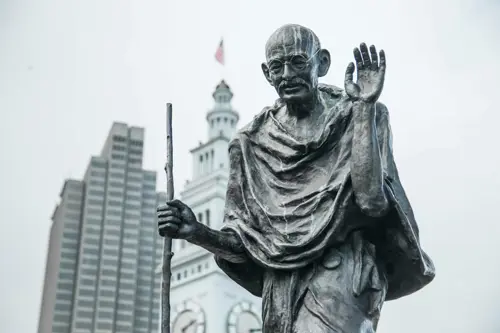In uncertain times, we often look for guidance—not just from the present, but from the past. History has given us extraordinary leaders, people who faced crises, division, and despair but responded with vision, courage, and an unshakable belief in a better world. As we navigate today’s challenges, their lessons are more relevant than ever.

After spending 27 years in prison under South Africa’s apartheid regime, Nelson Mandela emerged not with vengeance, but with reconciliation. He understood that true leadership is not about punishing the past but building the future. In a world increasingly fractured by political and social divides, Mandela’s lesson is clear: Forgiveness is not weakness; it is strength.
“Resentment is like drinking poison and then hoping it will kill your enemies.” – Nelson Mandela
What if we applied this to our own divisions? Whether in politics, workplaces, or communities, healing does not come from deepening the wounds. It comes from rising above them.

During the darkest days of World War II, Winston Churchill’s leadership kept Britain from crumbling. His speeches, marked by defiance and determination, reminded people that perseverance is often the difference between victory and defeat.
“Success is not final, failure is not fatal: it is the courage to continue that counts.” – Winston Churchill
Churchill’s lesson for today? Resilience is everything. Whether facing economic downturns, social upheaval, or personal struggles, endurance often outlasts adversity.

As the architect of the Universal Declaration of Human Rights, Eleanor Roosevelt understood that progress is built on the foundation of dignity and fairness for all. In today’s world—where human rights are challenged across borders—her vision remains essential.
“Where, after all, do universal human rights begin? In small places, close to home.” – Eleanor Roosevelt
Real change doesn’t start with governments; it starts with individuals. Defending the vulnerable, standing up for justice, and recognizing the humanity in others are everyday acts that shape a better world.

Gandhi’s philosophy of nonviolent resistance reshaped India’s struggle for independence and inspired civil rights movements worldwide. In an era where aggression often seems like the easiest path to power, his words remain a beacon:
“You may never know what results come of your actions. But if you do nothing, there will be no result.” – Mahatma Gandhi
The lesson? Change does not require violence, but it does require action. Whether advocating for human rights, social justice, or a better future, meaningful impact comes from persistent, peaceful resistance.

The former Czech president and playwright Václav Havel saw hope not as passive optimism, but as a driving force for change—even when success seemed impossible.
“Hope is not the conviction that something will turn out well, but the certainty that something is worth doing, no matter how it turns out.” – Václav Havel
Havel’s wisdom speaks directly to our times. Hope is not about ignoring reality; it is about confronting it with the belief that progress is possible.
The challenges of today—inequality, conflict, climate crises, political polarization—can feel insurmountable. But history reminds us that leadership is not about perfection; it is about persistence. The leaders we admire did not have all the answers, but they had the courage to ask the right questions and take action.
The question we must ask ourselves is this: What will future generations learn from us? Will they see a world divided by fear, or one united by compassion? The lessons of history are waiting—but it is up to us to apply them.
